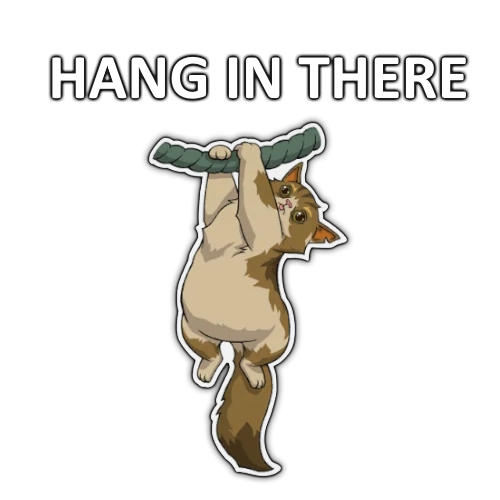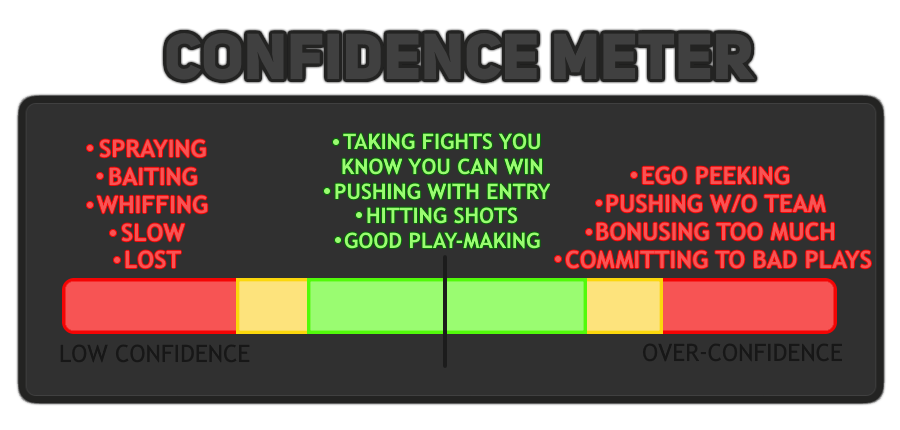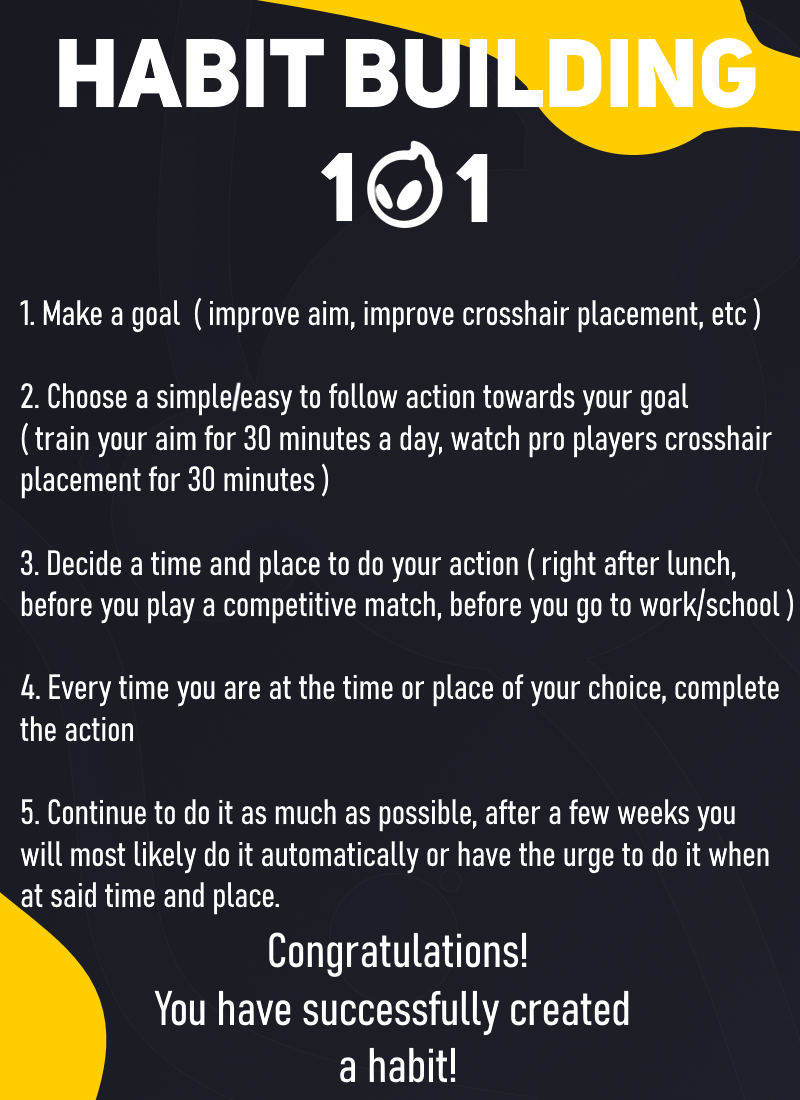I’m a sucker for self-improvement, whether it’s with my graphic designing, my aim, or any new hobby I pick up, I always try to inform myself, and find ways to improve efficiency. One of the first things I picked up on this path to building up my skills is how the mental aspect of improving at a certain skill is just as important as working on the mechanical aspects of it. For a game like VALORANT, the mentality you have when going into a competitive match or a deathmatch is going to greatly change what you take out of the experience. With the change of attitude or change of thoughts while playing, you can go from actively getting worse, to making leaps in your game. All of it comes through learning how to replace your bad habits with good ones, being critical of yourself, and the thoughts you should be thinking when watching others or yourself.
What Does Having a Good Mentality Even Mean?
Determining what it means to have a good mentality is not an easy question to answer, mostly due to the fact that a good mentality is made up of several factors that all need to be worked on separately, that all mesh together to create an environment for yourself that fosters personal growth and mechanical improvement.
The parts that I personally consider the main factors that make up a mentality are:
- Motivation
- Confidence
- Habit building
- Self-criticism (the right amount)
- Ego
You Have to Want It First
This may seem obvious, but if you do not want to improve at something, you won’t. But sometimes even when you want it, motivation can be hard to find. When it comes to improving at a skill, like VALORANT for example, sometimes you will feel like you are not improving or getting worse and will think about giving up. Feeling unmotivated at times is completely normal and usually happens for several reasons. Let’s talk about those reasons and then suggest methods to motivate yourself.
The first big mistake I see people make that can demolish motivation completely is when people compare themselves to someone else unfairly. It is fine to watch pro players and see how they play and compare it to your playstyle to better yourself, but when you compare yourself to someone and beat yourself up for not being as good as them, or not making as much progress as them, you will demotivate yourself. Whenever you find yourself in that habit, try and realize that everyone improves at different speeds and it is not a race, it is a marathon, it does not matter who gets there faster, just whether you get to your goal or not.
Another big mistake I see people make is not understanding what a plateau is. A plateau is a short or long stage when working on a skill, in any skill whether aiming, weightlifting, or knitting, where you see no apparent evidence. A lot of people give up when they hit a plateau because they think they cannot improve anymore, which is not true! When you hit a plateau, it just means you have reached a point where the current methods you are using to improve have lost effectiveness and you have to switch up your methods of improvement. An example from my personal experience is when I first started taking VALORANT seriously, I began aim training and went from Silver 2 to Plat 3 in only two acts almost solely from bringing my aim from an intermediate to advanced level, but then, I stayed Plat 3 for two more acts (hitting Diamond only for 2 games), then I dipped down to Gold 3 for another two, it was only when I changed up my approach, moving away from aim training and more towards working on restraint and game sense that I finally broke my plateau and hit Diamond. If you’re aim training and see a plateau, try and switch routines or focus on another aspect of your game, like game sense.

Another reason I see people lose motivation is due to bad experiences in-game. While there is no way to avoid smurfs or throwers in your games unless you have a full 5-stack all the time, there are ways to learn and improve even when you are given the shorter end of the stick. Even when you are up against a smurf or playing with toxic teammates, you can always look back on your VODs to find mistakes against Smurfs or highlight the, albeit rare, moments when you outsmart the smurf and win a fight, and learn to recreate those moments in other matches. The goal is to look on the bright side of those bad situations and just move past them and try again.
Now, how do you build motivation and keep working even when it is hard? To that question, there are several methods to improve motivation, some more simple than the others.
First off, you should try and build a regimen, or a hard schedule, to improve off of. Having specific times and conditions where you work on your skill is crucial to stay motivated and to consistently work. For example, for the first few months of my journey to improve in VALORANT, I aim trained right before bed at 9:30 P.M every, single, day. By creating specific times to work built an expectation within me to do that action every day, and I would feel bad the days I didn’t do it. Now building that expectation is something that takes time, and you should refer to the habit-building section of this article for more information.
Another important aspect of creating motivation is to track your improvement. When you want to gain or lose weight, you are going to weigh yourself to make sure you are on the right track and to motivate yourself to keep going when you see progress, the same goes for any other skill. If you do not track your Aim Lab or Kovaak’s average scores, you won’t know whether your aim is getting better or not, and if you do not look at your match stats using Blitz or any other tracker, you won’t know whether your game sense or crosshair placement is improving or not. It is crucial that you track and try to record all of your stats and scores to properly create expectations for yourself which will, in return, build motivation.
Overall, motivation is a combination of expectations and a desire to reach a goal that is heavily based on your mindset and habits. To control and build motivation you should avoid bad habits and create better habits.
Confidence is Key
Let’s face it, you are not TenZ. You cannot just ego-peek everything and win, and if you are, you are practicing mistakes and will eventually be punished for it. Even a top player like TenZ has restraint and understands what fights to take and what fights not to. Confidence in VALORANT means being confident that you can hit your shots and that your decisions are the right ones. While being confident is super important to hit your shots, being too confident can often cause as much trouble as a lack thereof. The goal is to find a balance of being confident but not too confident to where you are just going to rely on your aim alone. The hard part is finding how to get to that sweet spot, whether you are on one side of the spectrum or the other.

The most common of the two is having low confidence, which often results in relying on spraying instead of tapping for headshots, baiting your team due to being too afraid to push, whiffing overall due to nerves, playing too slow because you are not confident in your decision making, and overall being lost. I am going to outline a few tactics to work on your confidence. Often a lack of confidence comes from a lack of practice, whether for you that is aim training daily or just running a few deathmatches before you queue up for competitive. Another big factor to keep in mind is that confidence is often momentum-based, meaning how confident you are will be mostly determined by how well you played earlier. For example, if you are playing badly or lose a clutch your confidence will most likely deteriorate. A simple solution would be after a bad game, just take a break. Most times you are in a mental slump you can simply solve it by taking a one or two-day break from the game to mentally reset. I have found after extended breaks from the game I come back playing much better than before. Another great tactic to increase confidence is to get friends to queue with, whether it is a duo partner or a full team, having people lift you up when you do not feel up to par is always a sure-fire way to boost your confidence. Finally, review your record and watch over your games. VOD reviewing lets you know what decisions you make are good or bad decisions, so next time you are in a similar situation you can confidently make the right decision.
Now thankfully, most of the time having too much confidence is a problem that solves itself, by playing too confident you will be losing fights or making bad decisions that will most likely check yourself into being less confident. If that is not the case and you still feel as if you are too confident with yourself, having friends to queue with to tell you to dial back and not play so aggressively will help greatly. Another great way to correct confidence in the long term is to record and review your games. Being able to see your mistakes from outside the game is a lot more impactful than playing the game, as in the moment, you are too focused on winning to really think about your mistakes, but while reviewing the VOD, the game is already over and you can just focus on personal performance.
Habitual Whiffing
Habits are what make up your game entirely. Your movement, your aim, and where you put your utility should almost entirely be done without thinking. Having your mechanics be habitual frees up your mind to focus on rotations, more specific utility usage, and outplaying your opponents. However, all of those habits need to be built through hard work and require consistency. For some habits, it’s as much as creating a routine and for others, it is something you have to be actively looking out for every second. For clarification’s sake, we will divide the two up and talk about them separately. The first type of habit is a habit that is an activity rather than an action, an example would be working out every day, we are going to call this an ‘active habit’. The second type is an action done while doing something else, an example would be saying um and uh when speaking, we are going to call this a ‘passive habit’.
The easiest habits to get rid of or build are active habits, and for those, you can follow a fairly simple guide. For example, let us say that your aim in VALORANT has felt shaky recently and you want to get better aim, there is your goal. To accomplish your goal, you are going to start using Aim Lab to practice aiming every time you finish playing a game of VALORANT for 30 minutes, you have made a simple action to follow, and a time and place to do it. Now, all it takes is for you to do said action, in this case training your aim, every time you are done playing VALORANT. Eventually, after around 8-12 weeks, you will have developed a habit, and you will most likely launch Aim Lab without thinking or have the urge to do it after you are done playing.

The same guide can be used to get rid of a bad habit, let us say you always change your settings after you play bad, you already have the time and place (when you play bad). You just have to realize why what you are doing is bad to have a clear goal, in this case, you realize that changing settings bars you from having a consistent experience every time you play the game, preventing you from getting comfortable with any setup, so now your goal is to stick with one setup. Now every time you play bad, instead of changing your settings, try doing something different, whether it is reviewing your VODs or just thinking about how you died. The key is to replace that habit with a different, healthier, habit. After some time eventually, you will have gotten rid of that nasty habit.
Now, let us talk about passive habits, these are a bit harder to build and remove but take a shorter time, though building them is much easier than removing one. Building a passive habit requires active thought and isolation while doing the action you want to build a habit within. For example, let us say you want to start building the habit of counter strafing, you should try and create an environment where you will be counter-strafing often, so running a few deathmatches while making sure you are counter-strafing, and as long as you consistently counter-strafe over a few days to a week, you will have built your passive habit.
Now there are two methods to removing a bad passive habit. Firstly, try replacing your habit with another, healthier habit. A great example would be if you are automatically crouching when you shoot, try replacing that habit with counter-strafing instead, by building another habit that would trigger at the same time, in this case, making contact with an enemy, eventually, your healthy habit would overpower your unhealthy habit. If that does not work you can try creating an environment where you cannot indulge in the habit at all. An example would be unbinding your crouch key all together to avoid crouch spraying down enemies. Both of these methods are great and can even be used in conjunction with each other.
Yes, It Is Your Fault
One of, if not the most common advice professional players will give on improving at your game, is to constantly critique your gameplay, and diagnose any problems or mistakes in your gameplay. Even if you played near perfectly, got a 4K and your teammates threw the round, there is always something you could have played differently. There are always mistakes to be made in every situation that can be fixed. This does not mean you have to be hard on yourself and beat yourself up for every mistake, but it does mean you should address your own downfalls and mistakes in order to improve. Here is a handy guide to look at whenever you die in ranked.
Another healthy side effect of being critical of yourself is that you will find yourself being much more forgiving of other people’s mistakes, and find yourself getting mad at your teammates far less and will overall feel happier and will most likely play better because of it.
Having an Ego Will Get You Nowhere
Before we wrap up the guide, there is an important topic that must be addressed and is required in improving. Having an Ego is one of, if not the most, detrimental traits to possess when it comes to improving at something. When you truly believe you are above criticism and think you are better than others, you will never improve. You must understand that to improve you need to be willing to accept criticism from others and accept that you are not perfect, and can always improve, even if you are the best VALORANT player in the whole world, you can still improve.
Furthermore, if you approach improvement not as a competition but as a goal to reach, you will find improvement to come faster and easier. Helping others, surprisingly, is a fantastic way to improve. By helping others, you often find mistakes that you make through helping other people. By collaborating with people, you can learn new methods from each other and you allow other people to build off of your experience and methods to even further your own improvement. Always consider criticism and advice, at least consider it to the point where you can recognize whether the criticism or advice is valid or not, and work from there.
Conclusion
Whether it’s motivation, confidence, habit-building, self-criticism, or ego, the aspects that make up your mindset are extremely important in creating an environment that fosters improvement and if you ignore these aspects, you will find yourself not improving and lacking any motivation to work on yourself. While we mostly talked about VALORANT, these aspects make up any mindset for any goal or skillset, and the methods taught here can mostly be applied to anywhere in life and should. We here at Dignitas hope you keep this guide in mind any time you feel unmotivated or lost when trying to better yourself, and we hope you overcome any obstacle that comes your way.





